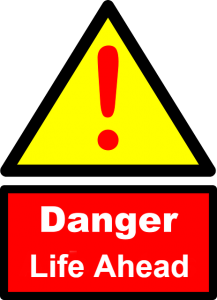 Will someone please start cutting away at the red tape of health and safety!
Will someone please start cutting away at the red tape of health and safety!
I get the basic principle of why it was brought in but, just like the financial services act, when did it become this all-powerful behemoth that quite often stifles innovation or creativity?
I get it; you do a dangerous job you should expect a structure of H&S that will protect your life and limb while you go about your business. You eat food stuff you would like to know that it has been produced under requirements to make it safe for consumption. You catch a train you expect to get from A to B in one piece…..
Health and safety…a step too far
My question is, when did it start being needed in almost every aspect of our lives where a certain amount of self-preservation, awareness, or common sense would suffice?
Why did it ban conkers as not being safe for children to play with? How come Dodgem cars are no longer allowed to bump into each other in case of whiplash? What reason do offices have for banning staff from moving chairs in case they hurt themselves? Why can’t university students throw their mortar boards into the air? Swimming pools not allowed to lend inflatable arm bands in case of passing on germs, plasters being banned from office first aid boxes in case of allergic reaction, I could go on. In the latter case- if you are allergic to plasters surely you can say so? What is better, bleeding all over the office floor or being sensible and asking about allergies before sticking the plaster on? Plus, sorry to harp on, but first aid boxes also contain epi pens for allergic reactions!
In my quoted examples, I can see that someone has looked at the activity and can perceive a potential danger but has anything ever happened? Are we putting rules in place “in case” rather than, “because”?
Life is dangerous…should we ban living?
 From when we squirt out of the womb life is dangerous. That is the nature of life and it has been thus ever since we stood up and started walking around. The big stuff, fine, legislate and protect people but the smaller stuff we really ought to work it out for ourselves. We are supposed to get scrapes, bumps and bruises – that’s how we learn and it’s how we get ideas on how to improve things.
From when we squirt out of the womb life is dangerous. That is the nature of life and it has been thus ever since we stood up and started walking around. The big stuff, fine, legislate and protect people but the smaller stuff we really ought to work it out for ourselves. We are supposed to get scrapes, bumps and bruises – that’s how we learn and it’s how we get ideas on how to improve things.
By constantly adding more layers of red tape to protect against perceived but not proven dangers we become so risk averse that I believe it stifles creativity and innovation. It smothers inventiveness and forward thinking and will eventually stunt our development and even evolution. I don’t know about you but I feel suffocated by the sheer monotony of being told that “you can’t do that, it’s against health and safety”.
We are in serious danger of becoming such a molly coddled, cotton wool wrapped society that we will all die from sheer boredom. Britain built its empire on adventure, taking risks, going where no man had gone before…and that was just getting on ships, charting dangerous seas and facing hostile natives! Space exploration is terrifyingly full of risks; did the Health and safety inspector say, “Nope can’t do that, the risk assessment says not”.
Risk is a natural part of exploration and discovery
Next thing we’ll have risk assessments for falling in love- because let’s face it, human emotion is fraught with danger. Creativity, entrepreneurship, scientific breakthroughs all come from taking leaps into the unknown. Heaven forbid that our brightest minds take the leap only to find the health and safety gurus there shaking their heads.
When did we become so fearful? I wonder if the rise of litigation, compensation claims and the like reflect our inability to take responsibility for risk taking. I also feel it distracts focus and removes resources from the real battles that should be fought. Large corporations still get away with endangering humankind with environmentally unsafe practice; untested drugs; appalling working conditions, while the courts are tied up with petty legislation and spurious health and safety claims.
Life is risky and so we have created a monster that would regulate every risk we take but instead of making us feel safe, it magnifies fear. On a purely practical basis, all this legislation costs money, which could be spent on better assessing real risks, to human health and the planet.
Cut the red tape- and take some personal responsibility for the health and safety of yourself and those around you.

